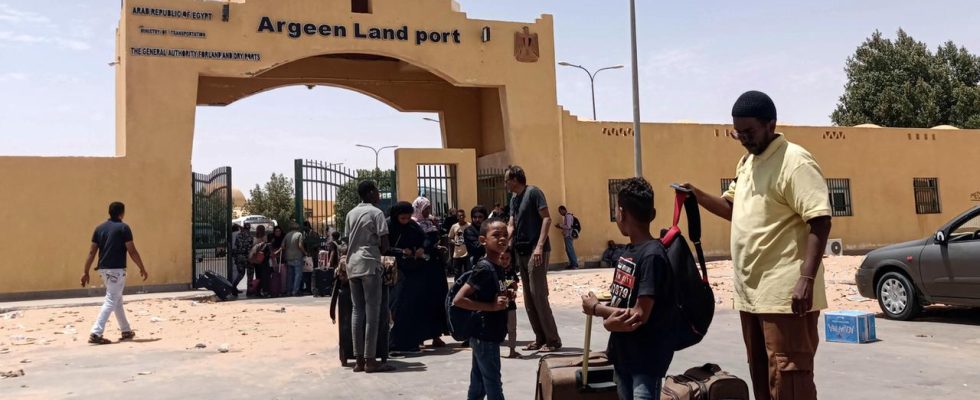Thousands of Sudanese have crossed the border into Egypt in recent days. The refugees are looking for protection there – but new uncertainties and problems await them in Aswan and the surrounding area.
A narrow bench in the shade, a sachet of juice for the children – Iman Abdullah and her family gather strength at a bus station near Aswan.
A grueling journey lies behind them: six days by bus from the Sudanese capital Khartoum to across the border to Egypt – at temperatures of around 40 degrees in the shade. From the south of Egypt, she and her brother’s family want to go further north.
“We will probably go different ways from Cairo,” she says. “But we try to stay together as long as possible so the kids don’t feel so strange.”
Tens of thousands of refugees from Sudan
Iman Abdullah and her family are on the run – like tens of thousands of other people. The struggles of the two most powerful men in Sudan have worn them down. There is hardly any electricity, food, drink, no medical care and certainly no security.
It feels like a war without a reason. They drive out the people, they drive out the children. We used to be very well off – but from one moment to the next we are displaced, have no more work and no money.
Iman and her family are among the Sudanese who could afford the expensive bus tickets to Egypt. Since the fighting began, the price has increased tenfold, with tickets costing up to 1,000 euros per person.
Iman is a dentist. Her three children went to international schools in Khartoum and speak English and Arabic. But now her seven-year-old son Mustafa is sitting next to her, dejected and frightened. The uncertainty of the past few days has been particularly difficult for the children, says Iman. Eleven-year-old Tala explains why: “It hurts me a lot to leave my country and my whole family behind. It hurts to leave everyone behind.”
Neither eating nor drinking
A few meters away, a driver is heaving the luggage of several travelers onto the roof of a minibus. Most only have one suitcase with them. Shehab Al-Din’s is almost empty. “We had the leftovers from our fridge with us, they lasted for a day,” he says. “The second day we had nothing – neither food nor drink. One day it was beans with a little salt, another falafel.”
Arrived on the Egyptian side they would have been given clean water, juice and chips. “The children were incredibly happy – as if a dream had come true.”
Shehab Al-Din holds his two-year-old daughter in his arms. The tall man wears a stylish shirt and matching leather bag. In Khartoum he worked in a medical laboratory until it became too dangerous in the capital.
The war has arrived in Khartoum
The situation is bad, he says, “extremely bad.” It is catastrophic – and there is no help from organizations – neither humanitarian aid, nor volunteers, nor medical care. Everything is out of order.”
Under no circumstances does he want to return to Sudan, says the 39-year-old. In the past there have been many riots and fights between different groups. But now the war has arrived in Khartoum:
The shelling never stops – the rockets, the guns, the planes. Dead bodies lie everywhere in the streets of the capital. Rocket projectiles hit residential buildings – completely randomly.
“We have no plan”
Shehab, his wife and his two children want to continue to Cairo. But train tickets are currently sold out. Shehab counts the Egyptian banknotes in his hand. Are they enough for an overnight stay in Aswan? He looks up and thinks. Iman and her children are sitting on the bench opposite. Wait.
“We don’t have a plan,” says Iman. “The most important thing for us was to escape the war. Now we have to see what happens.”

